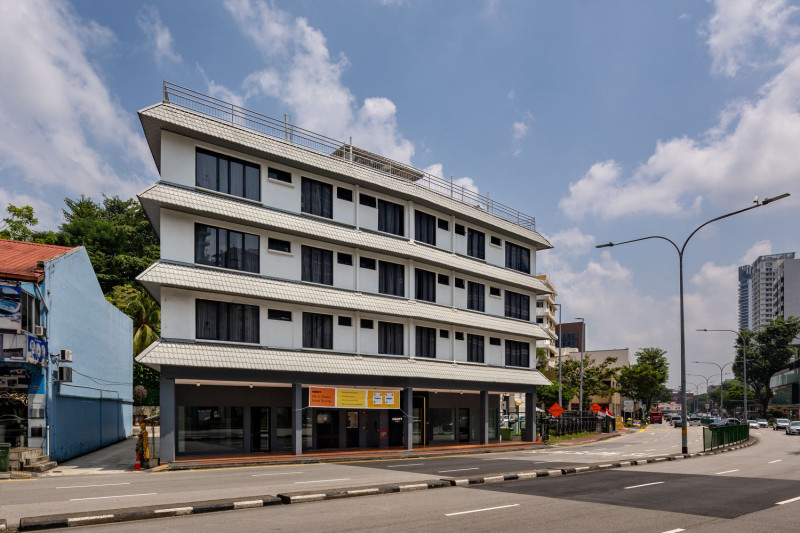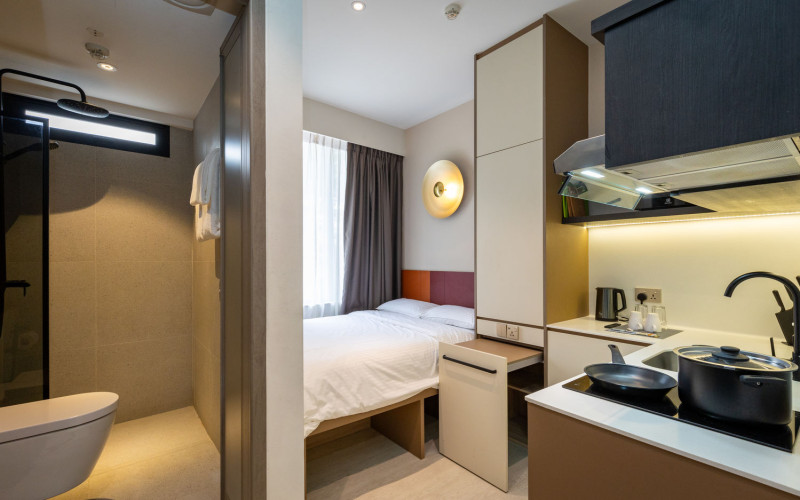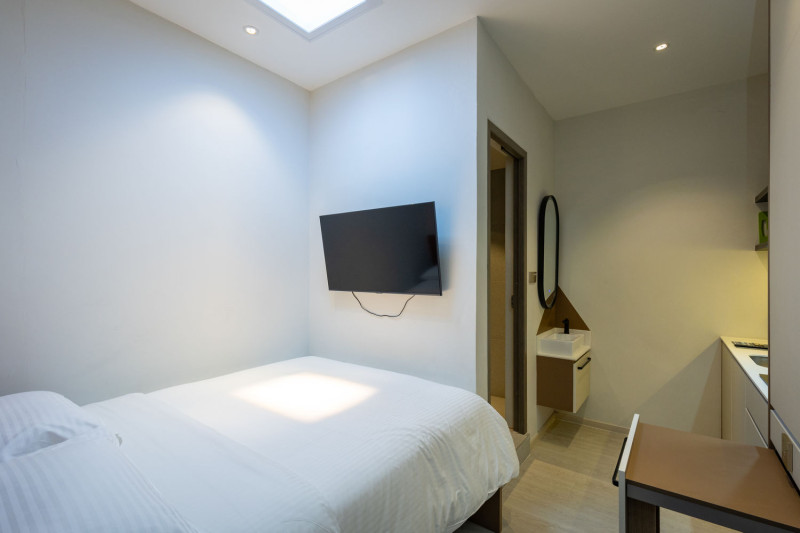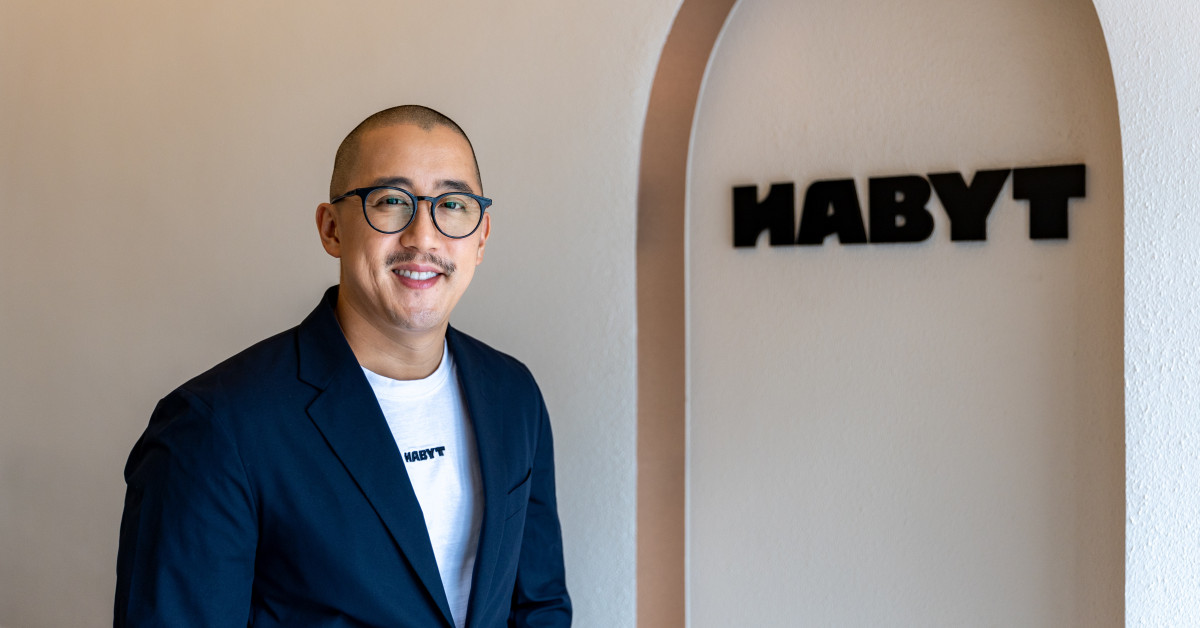Habyt opens two new properties, expands lineup of short-term options
Co-living operator Habyt has opened two new properties in Singapore as it looks to diversify its product offering in Singapore to strengthen its market position. The 39-room Habyt Novena, at 471 Balestier Road, is a walk-up hotel with five studio room options, while Habyt Kallang, at 115 Geylang Road, is a 27-room co-living hotel.
Habyt has taken over the management of both properties from another co-living operator, Coliwoo, a subsidiary of LHN Group.
471 Balestier Road, formerly the Balestier Hotel, was jointly acquired by Coliwoo and Four Star for $15 million in 2021. At the time, the acquisition was intended to fuel Coliwoo’s expansion plans. 115 Geylang, formerly known as Hotel Gay World, was also acquired by LHN for $13.5 million in 2021 and LHN said at the time that it intended to operate the property as a co-living space.
Read also: Beyond just shelter, co-living tenants demand more from operators
Advertisement
Advertisement
According to Habyt’s Asia Pacific CEO, Jonathan Wong, the operator is managing both properties on a master lease. “We treated the offer to manage both properties as independent opportunities,” he says. “We saw the strategic opportunities that the location of each of the two properties offer and we had a clear vision of the type of product we wanted to roll out.”

The 39-room Habyt Novena, at 471 Balestier Road, is a walk-up hotel with five studio room options. (Picture: Samuel Isaac Chua/The Edge Singapore)
In general, corporate bookings and group travel bookings through travel agencies are a big contributor to short-stay demand that Habyt receives, and these groups typically stay for three to six nights, says Wong.
On the other hand, the demand from long-stay residents is more diversified and generally seasonal in nature; for example, the influx of international students coincides with the start of university terms, while expatriate residents typically move in at the start of the year. “Demographically, the age bracket (of co-living residents) hasn’t changed much, with most of our residents between 21 and 35 years old,” says Wong.
Read also: Flexible housing provider Habyt raises EUR40 mil in series C funding
Advertisement
Advertisement
He adds that the past two years have also seen more locals taking up co-living, driven by a desire to live independently. “These are often young professionals just starting their first job, and our ability to offer zero-deposit options on a flexible lease is very appealing.”
A new segment of local co-living residents that has sprouted over the past two years is the young unmarried couples who want to try cohabitation before committing to marriage. “Although proportionally in smaller numbers, it is meaningful in terms of how this new demographic has grown,” says Wong.

One of the studio rooms at Habyt Novena. (Picture: Samuel Isaac Chua/The Edge Singapore)
With most of Habyt’s flexible accommodation options in Singapore geared towards long-term stays of more than three months, it has not been economical to offer accommodation options of less than two months at a location like Habyt Cantonment, he says.
Read also: Hmlet rebrands as Habyt, Jonathan Wong appointed as Habyt CEO for Asia Pacific
Advertisement
Advertisement
“But with a purpose-built short-term accommodation product like what we are offering at Habyt Novena and Habyt Kallang, we can pass on all the marginal savings…on to the consumer. And we also leverage many of our in-house efficiencies to ensure we can offer it at a competitive price,” says Wong.

One of the studio rooms at Habyt Novena. (Picture: Samuel Isaac Chua/The Edge Singapore)
The company is working harder to ensure that consumers are plugged into the broader Habyt ecosystem of communities and groups. “For some of our co-living properties like Habyt Novena, we just don’t have the space to offer the types of communal areas like co-working areas that can foster that sense of belonging,” Wong says.
Broadening Habyt’s lineup
Habyt Novena and Habyt Kallang have been positioned to meet the accommodation demands of those looking for nightly options or up to six-month leases, says Wong. “We approached these two new properties with the intention of them offering a wider range of flexible accommodation leases. For us, it’s a relatively new product category that fills in a gap between our long-term co-living products and our hotel offering,” says Wong. He estimates that Habyt Novena and Habyt Kallang will ultimately stabilise in the coming months with about 60% of the rooms booked for nightly or less-than-three-month leases, while the remainder will be residents in long-term leases of more than three months.
Small, but private, spaces in demand
For residents who need six-month long accommodation, having a self-contained apartment with in-built functionality is high on their list of priorities, says Wong, adding that this means having the ability to cook, do their laundry, work, and relax within their private space. This is why all of the rooms at Habyt Novena and Habyt Kallang are studios with those amenities, and room sizes range from 118 to 183 sq ft. This is compact compared to some of the larger-sized rooms that Habyt manages in Singapore, in locations like Habyt Cantonment where its rooms range from 118 to 441 sq ft. In Singapore, the demand for short-term stays of between one and three months has been growing over the past few years and is emerging as a relatively untapped segment in the co-living market, says Wong.
Staying versatile
To stay competitive in the local market, Habyt must offer flexible accommodation “at all levels and across all demand types, including diverse use cases”, says Wong. “Studios are the most versatile product that enable us to achieve those goals. There are also commercial benefits from the density of rooms and the demand for privacy is soaring across the customer demographics that we follow.” Wong notes that last year the demand for private en suite rooms across Habyt’s portfolio of properties in Singapore outstripped the typical level of demand seen in the preceding years. “These en suite rooms are more expensive, but a lot more people are willing to pay for that privacy.” Moreover, the overall usage of communal spaces, like work areas and kitchens, across the co-living operator’s properties in Singapore has remained flat in recent years. The rise in short-term stays of less than three months also means that the community spirit that was once the bedrock of the co-living concept is gradually giving way to a more transient resident population within each co-living property, says Wong. He adds that based on feedback gathered by Habyt from its residents, the allure of meeting new people is no longer the primary reason for choosing a co-living arrangement. “[Although] the perk of mingling with different people remains a core part of the co-living experience, it is no longer the underlying appeal. Instead, people prioritise how quickly they can secure an available room and if it meets their budget,” says Wong.
Evolving co-living trends
The “stickiness” of hybrid work arrangements has started to translate into stronger demand for flexible accommodation options in city-fringe neighbourhoods. “Moreover, city-fringe areas tend to offer a wider breadth of amenities compared to the city centre. And more professionals seem willing to trade proximity to their work for affordability and larger living space,” Wong says. The core of Habyt’s offering is still its competitive medium- to long-term accommodation options, and the range of hotel and short-term accommodation options it has recently added compliment the operator’s overall presence in the local market, says Wong. “The macro trends underpinning the demand for flexible living options such as co-living supports the growth of this market, especially as the desire for more flexibility and affordability comes to the fore,” he adds.